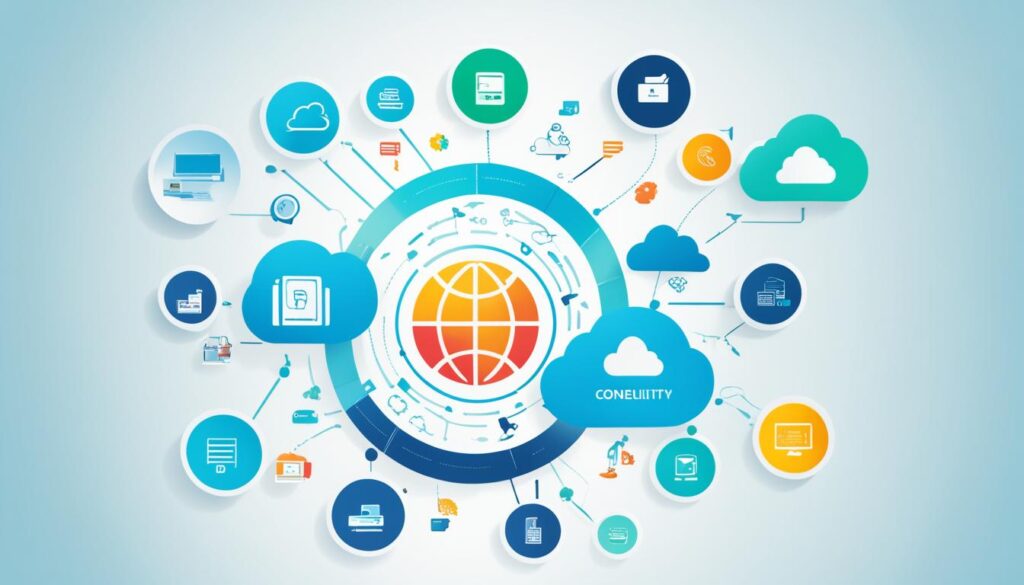Cloud computing is changing how we work with data. Now, we don’t have to depend on local servers and hardware. Data is stored and used over the internet, giving us more freedom and power.
It includes servers, storage, databases, and more. This setup lets companies innovate quickly and adjust their resources. Plus, with the pay-as-you-go method, costs are lower. It’s a great option for any business.
What’s so great about it, you ask? Companies no longer need their own data centers. Everything is managed by cloud providers. This means companies can do what they do best without worrying about IT stuff.
Key Takeaways
- Cloud computing delivers computing services over the internet.
- It offers faster innovation, flexible resources, and economies of scale.
- Cloud services are pay-as-you-go, reducing operating costs for businesses.
- Cloud computing eliminates the need for onsite data centers and infrastructure management.
- Businesses can scale their computing resources as needed.
Benefits of Cloud Computing
Cloud computing is a top choice for many due to its benefits. It offers easy data storage and meets computing needs. Here are some reasons cloud computing is great:
Cost-Effectiveness
With the cloud, there’s no need for big capital or local servers. Businesses save money by not buying and maintaining servers, storage, and networks. They can pay for cloud services monthly. This saves money and lets them spend funds elsewhere.
Speed and Global Scale
The cloud makes it quick and easy to get more computing power. Companies can easily add or take away resources as needed. This quick access means they can start new projects fast. Cloud services are also available all over the world. This means reaching customers everywhere, with no need for local offices.
Productivity
The cloud takes away many IT tasks, giving time back to businesses. Cloud providers manage things like updating software and making sure everything runs smoothly. This means more focus on important business goals. Teams can spend more time adding value, creating products, and serving customers.
Performance and Reliability
Cloud companies use the latest tech in secure facilities. This means better performance and less chance of issues. They also back up data and offer recovery services. This keeps business data safe, even if something goes wrong.
Security
Keeping data safe is a big deal for cloud providers. They use strong security measures to protect data. They follow strict rules, giving companies peace of mind about their data’s safety.
| Benefits | Description |
|---|---|
| Cost-effectiveness | Elimination of capital expenses and onsite infrastructure |
| Speed and Global Scale | Fast provisioning of computing resources and global accessibility |
| Productivity | Reduction in IT management tasks, enabling focus on core activities |
| Performance and Reliability | Enhanced performance, reliable data centers, and disaster recovery |
| Security | Robust security measures and compliance with regulations |
Cloud computing brings cost savings, quick scalability, high productivity, and strong security. These benefits help businesses grow, stay efficient, and compete in the digital world.
Public, Private, and Hybrid Cloud
Cloud computing offers various deployment models to meet different business needs. These include public, private, and hybrid clouds.
1. Public Cloud
Companies like Microsoft Azure own and run public clouds. They’re open to many organizations across the internet. These clouds offer scalable resources and on-demand access to various services.
2. Private Cloud
A single organization uses private clouds. These can be at the organization’s own data center or managed externally. Private clouds provide a high level of security by keeping data exclusive to the organization.
3. Hybrid Cloud
Hybrid clouds mix public and private cloud features. They let businesses move data and apps between the two. This setup combines the public cloud’s cost savings with the private cloud’s security.
Hybrid clouds help businesses improve their operations and security. They can easily adjust the resources to meet changing needs. This makes their overall resource use more efficient.

Choosing a hybrid cloud strategy allows companies to get the best of both worlds. They can build a customized, efficient, and secure cloud solution for their needs.
Types of Cloud Computing Services
Cloud computing offers many services that help businesses. It includes Infrastructure as a Service (IaaS), Platform as a Service (PaaS), and more. These services meet different needs of companies.
Infrastructure as a Service (IaaS)
IaaS gives companies access to IT infrastructure like servers and storage. Businesses can rent what they need. They can adjust the size according to how much they use. This helps save money and resources.
Platform as a Service (PaaS)
PaaS lets developers work in an online environment. They can develop, test, and launch applications easily. PaaS takes care of the underlying infrastructure. This lets developers focus only on their applications. It makes their work faster and more efficient.
Software as a Service (SaaS)
SaaS is software delivered over the internet, like email and CRM software. Companies pay for SaaS on a subscription basis. They don’t need to install or maintain it. This makes running software easier and more accessible.
Serverless Computing
Serverless computing is for building apps without handling servers. It means developers only need to write the code. The cloud takes care of everything else. This approach is cost-effective and reduces development complexity.
Cloud-native tech, such as containers and microservices, enhances cloud use. These tools make deploying and scaling apps faster. They also help manage cloud resources better.
Cloud Computing Applications
Cloud computing has changed how both businesses and people use technology. It covers many sectors, solving different problems. Let’s look at what cloud computing can do:
Data Backup and Disaster Recovery
Cloud computing is great for keeping data safe and for recovering after a disaster. It backs up data in the cloud, so important info is always secure. Businesses can quickly get their data back, reducing downtime and risks.
Email Services
Email is crucial for communication, and cloud email services make it better. They let users check emails from any internet-connected device. This offers more freedom and ease in keeping up with messages.
Virtual Desktops
Cloud computing allows for virtual desktops, accessible from any device. It’s ideal for remote work or multi-location businesses. This kind of setup simplifies IT and makes work more flexible.
“Cloud computing enables the creation of virtual desktop environments, allowing users to access their personalized desktops and applications from any device and location.”
Software Development and Testing
The cloud is a perfect fit for software development and testing. It provides tools and environments that scale easily. This fast-tracks the app-making process, thanks to quick access and resources on demand.
Big Data Analytics
Cloud computing is key for analyzing big data. It offers vast storage and processing power. Companies can use it to get insights from large volumes of info, spotting trends and making smarter decisions.
Customer-Facing Web Applications
For web apps that need to handle lots of visitors, cloud computing is a must. It ensures apps run smoothly even when traffic is high. Businesses use this for better e-commerce, media, and web-based services experiences.
Cloud computing does even more. It helps in healthcare, spotting fraud in finance, and serving online games. It’s a big part of driving change and progress in many fields.
The benefits of the cloud, like flexibility and efficiency, are crucial for today’s companies. It helps them keep up in a fast-changing tech world.
Choosing a Cloud Provider
Microsoft is a top player in cloud computing, offering Azure. Azure is a powerful tool for businesses of all sizes. It helps them get the services they need.
Choosing a cloud provider means looking at key points. You want a partner that’s reliable and offers strong security. This is crucial in today’s digital world.
Also, consider pricing and how cost-effective it is. Cloud computing often saves more money than keeping things in-house. Look at the services each provider offers.
Good customer support is a must. A reliable cloud provider will help with any tech problems you face.
Compare different cloud providers carefully. Microsoft Azure stands out with its strong tech and a wide range of services. It’s a popular pick in the cloud market.
Think about reliability, security, costs, services, and support. These are key in finding the best cloud partner for your business. Microsoft Azure offers a full package for digital change. It opens up new opportunities for your business.
Origins and Growth of Cloud Computing
The start of cloud computing goes back to Dr. Joseph Carl Robnett Licklider’s work in the 1960s. Dr. Licklider had a big idea to connect people and computers worldwide. This laid the foundation for cloud computing.
By the early 2000s, cloud computing became real through companies like Amazon Web Services. They, along with Google Apps and Microsoft Office, offered services from the cloud. This let businesses and people use the cloud for different needs.
Cloud computing has changed how we store and share data, work together on projects, and use software. It’s now key to how we understand and use technology in daily life.
The cloud market has grown a lot. More people and businesses are spending money on cloud services. They like the cloud for its ability to grow with their needs, save money, and increase productivity. The cloud market is set to grow even more in the future.

The Growing Cloud Computing Market
| Year | Market Size (in billions) | Annual Growth Rate |
|---|---|---|
| 2016 | 100 | 18% |
| 2017 | 130 | 20% |
| 2018 | 170 | 22% |
| 2019 | 220 | 24% |
| 2020 | 280 | 26% |
Businesses are using cloud services more for important tasks, storage, and software needs. The rise of new tech like AI and big data also drives the need for cloud services.
Dr. Licklider’s vision has really taken off. Now, cloud tech is booming thanks to companies like Amazon, Google, and Microsoft. With its growth and new improvements, cloud computing shapes how we deal with information and technology.
Components of Cloud Computing Architecture
Cloud computing uses a strong framework to operate. It includes data centers, networking, and virtualization. These parts work together to ensure everything runs smoothly and well.
Data Centers
Data centers are where cloud computing starts. They hold the servers and storage machines that keep and process data. These centers are designed for reliability, growth, and safety.
They have backups for power, cooling, and network access, so they don’t stop working. Placing them wisely helps lower delays and makes using the cloud better for everyone. This way, companies can skip the headache of managing their own hardware. They can then focus on what makes their business special.
Networking Capabilities
Networking is key in cloud computing. It connects users to the cloud’s services. With fast networks, people can quickly and safely reach their apps and data.
Good networking also keeps information safe as it travels back and forth. Load balancers ensure that too much network traffic doesn’t slow things down. They spread the load across many servers.
“Networking capabilities in cloud computing enable seamless communication between users and cloud resources, ensuring fast and secure access to applications and data.”
Virtualization
Virtualization is critical in the cloud’s design. It means creating virtual versions of hardware and resources. This way, cloud providers get the most out of their systems.
By virtualizing, they can share resources better, save money, and be more flexible. It also makes sure users or apps stay separate, which keeps things secure. This setup supports advanced cloud tech like containers for apps or serverless models.
| Component | Description |
|---|---|
| Data Centers | Houses servers and storage systems |
| Networking Capabilities | Enables connectivity and data transfer |
| Virtualization | Abstracts IT infrastructure for resource optimization |
The mix of data centers, networks, and virtualization is the heart of cloud computing. It lets businesses use the cloud’s power, growth, and savings.
Cloud Computing Services and Models
Cloud computing has many services to fit different business needs. It’s important for companies to understand these services. Then, they can choose the right ones for their cloud needs. Here are the main ones:
Infrastructure as a Service (IaaS)
IaaS gives organizations basic computing resources when they need it. This includes virtual servers, storage, and the ability to connect them. Companies don’t have to worry about owning and managing hardware. Instead, they can just get the resources they need, fast. This kind of service lets them focus on their own apps and services.
Platform as a Service (PaaS)
PaaS is a platform for building and managing applications. It’s set up and ready for developers to use. Developers can build, test, and put out apps without worrying about the base infrastructure. This makes it easier for them to create new apps and solutions.
Software as a Service (SaaS)
SaaS lets users use software over the internet. They don’t need to install the software on their devices. This is good because it means things can be accessed through a browser from any device. It also makes things simpler for companies offering software.
Serverless Computing
Serverless (or FaaS) means running applications without dealing with servers. Companies only pay for the time their apps are running. This service can adjust based on how much you need it. It makes things cost less and is easier for owners.
Companies can pick the cloud services they need. For example, they might use IaaS for control over the basics but SaaS for some specific apps. The great thing is, these services are flexible and make it easy to grow and change. This helps companies be more creative and modern.
Cloud Computing Benefits for Businesses
Cloud computing is a game-changer for businesses. It’s a cost-effective and efficient way to manage data and apps. We’ll look at how it brings cost-effectiveness, speed, scalability, and strategic value to the table.
Cost-Effectiveness: Using cloud computing cuts down on costs. Instead of big upfront fees for hardware and software, you pay as you go. This lets you use your money wisely and avoid extra spending.
Speed: Moving to the cloud means you can launch things faster. You can start using computer power right when you need it, without waiting to buy or set up. This helps you keep up with the market and move ahead of your competition.
Scalability: Cloud services grow as you do, which is perfect for busy times or new projects. You don’t need to buy more servers; you just get more from the cloud. This keeps your customers happy and your business running smoothly.
Strategic Value: The cloud opens the door to new tech like AI and IoT. These tools help you learn more, work better, and offer your customers what they really want. Adopting new tech through the cloud keeps you competitive and ready for growth.
In conclusion, cloud computing is a smart choice for businesses. It saves money, speeds up your work, adjusts to your needs, and brings in new tech. With the cloud, your business can be more efficient, flexible, and ready for success.
Cloud Computing and Everyday Life
Today, cloud computing is key in our connected lives. It brings easy-to-use apps for email. Plus, it makes streaming and remote work simpler. Cloud tech has changed how we use and work with technology.
Cloud applications have transformed communication and entertainment. They let us check emails anywhere and watch shows easily. These platforms have made life more comfortable and open. We can share files, photos, and docs with anyone, without needing storage devices.
Cloud computing allows people to work from anywhere, not just in offices. It uses apps and platforms for work and meetings online. This freedom helps with balancing work and life, and boosts work quality.
For companies, cloud tech is vital for reaching customers well. They can use the cloud for personal support and effective marketing. With cloud CRMs, they learn about customer needs, helping them improve products and services.
Cloud computing also helps new tech grow. Things like AI, machine learning, and quantum computing need the cloud’s power to work. This boosts innovation in different fields.

Benefits of Cloud Computing in Everyday Life:
- Easy access to cloud applications for seamless email and streaming services
- Flexible remote work opportunities for enhanced work-life balance
- Improved customer engagement through personalized interactions
- Enabling the development and adoption of cutting-edge technologies
As cloud computing grows, it fits more parts of our lives. It’s key in both personal and business worlds. Cloud tech is now a core tool in our digital age.
Conclusion
Cloud computing is changing how both companies and people handle data. This tech offers many advantages to businesses, like saving money, working faster, and getting bigger when needed. The cloud has many uses, from storing data to creating new software to analyze data better.
As tech moves forward, the cloud will become even more important for new ideas and building the digital world. It’s already making big changes in fields such as healthcare, finance, and gaming. For example, it helps doctors give personalized care, stops fraud quickly, and delivers online games smoothly.
The future of cloud computing looks bright. With new tech like containers and microservices, businesses will run even smoother. Technologies like generative AI and quantum computing will push cloud computing to do even more. This will kick off a whole new era of digital change.
FAQ
What is cloud computing?
Cloud computing means getting computer services over the internet. This includes servers, storage, and software. It is known for being flexible, scalable, and cost-effective.
What are the benefits of cloud computing?
Cloud computing saves money, allows quick app deployment, and is easy to adjust. It increases productivity, works well, and is secure.
What are public, private, and hybrid clouds?
Public clouds are run by companies like Microsoft Azure. Private clouds are only for one business. Hybrid clouds mix public and private options.
What are the types of cloud computing services?
There are several services like Infrastructure as a Service and Software as a Service. They let us use software over the internet without owning it.
What are the applications of cloud computing?
Cloud computing is used for many things like backing up data and running email. It’s also great for developing software, analyzing big data, and making web apps.
How do I choose a cloud provider?
Look at reliability, security, and what they offer. For example, check out Microsoft Azure. Compare different providers to find the best fit.
What is the origin and growth of cloud computing?
Cloud computing started in the 1960s with early global networking ideas. It took off in the 2000s with big names like Amazon and Google. Now, it’s growing fast.
What are the components of cloud computing architecture?
In cloud architecture, you have data centers, networking tech, and load balancers. There are also content delivery systems and the option for software-defined networks.
What are the different cloud computing services and models?
There are models like Infrastructure as a Service and Software as a Service. Each has its own way of giving us online tools and systems.
What are the benefits of cloud computing for businesses?
Businesses find cloud computing very beneficial. It saves money, speeds things up, and makes growth easier. It also helps stay competitive and serve customers better.
How does cloud computing impact everyday life?
Cloud computing powers common tools like email and streaming services. It promotes remote work and improves how companies connect with customers. It also enhances fields like healthcare and gaming through data use.
How will cloud computing shape the future?
Cloud computing will keep enhancing technology and innovation. It supports new trends, making companies more competitive and efficient.


















